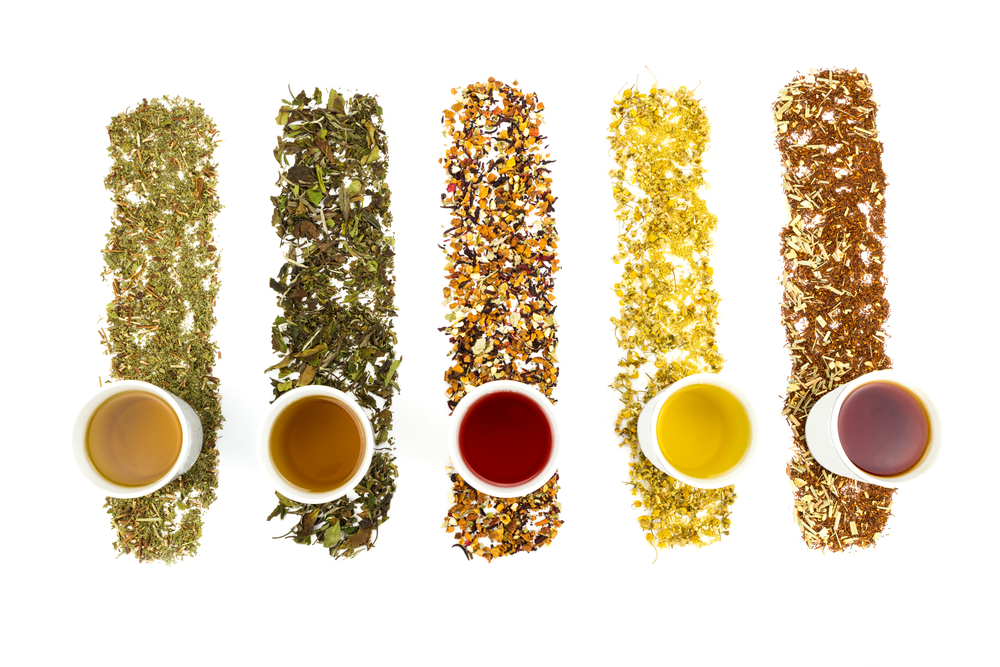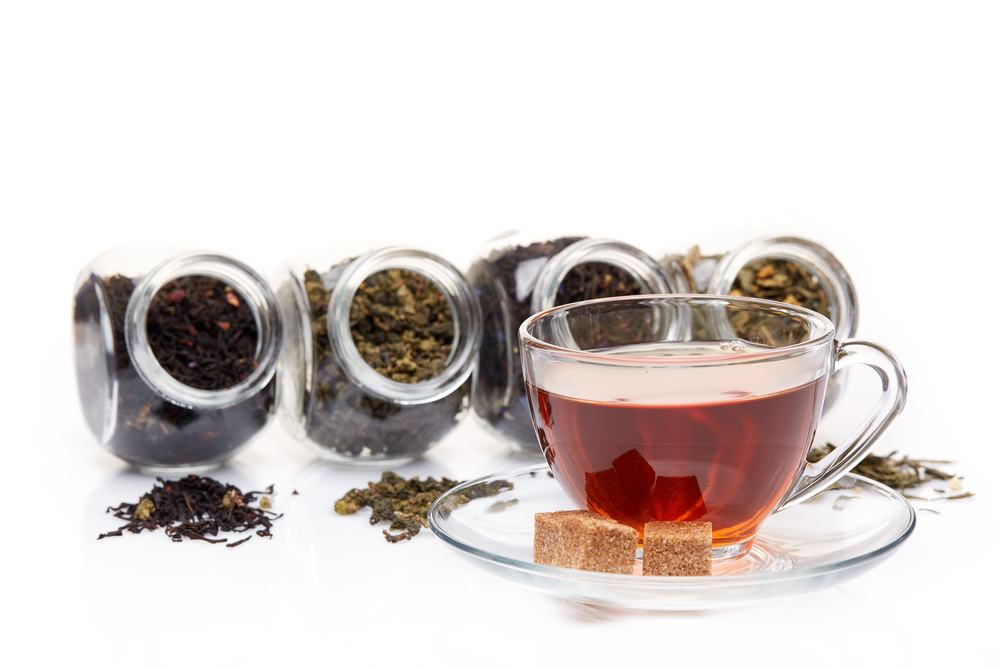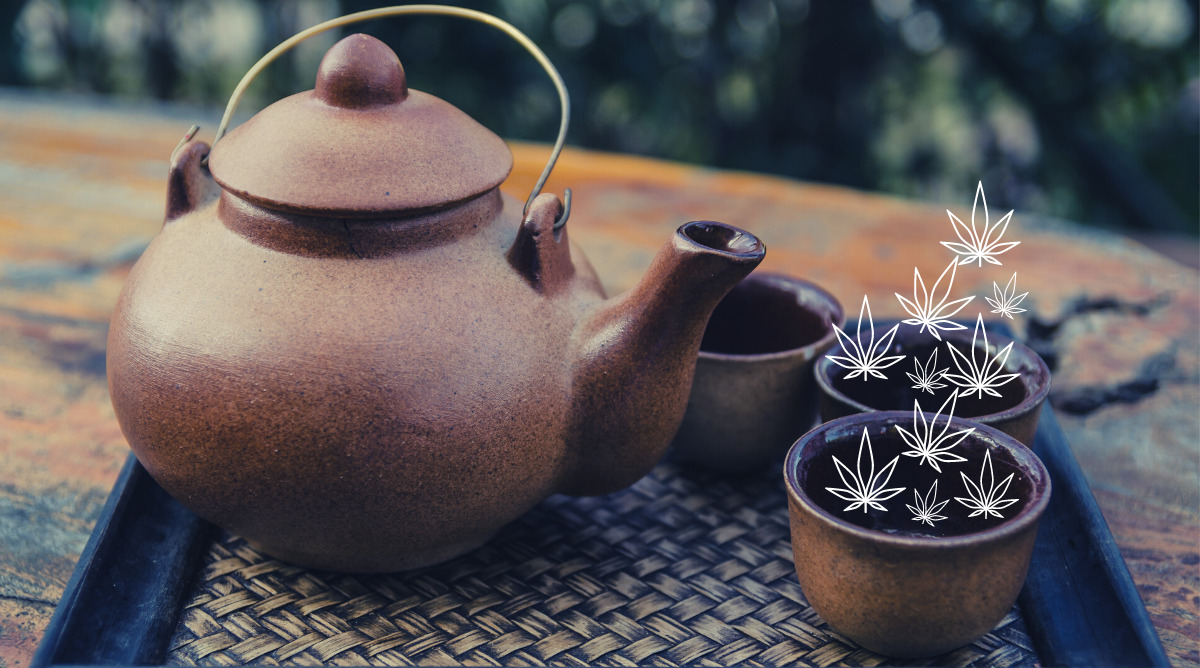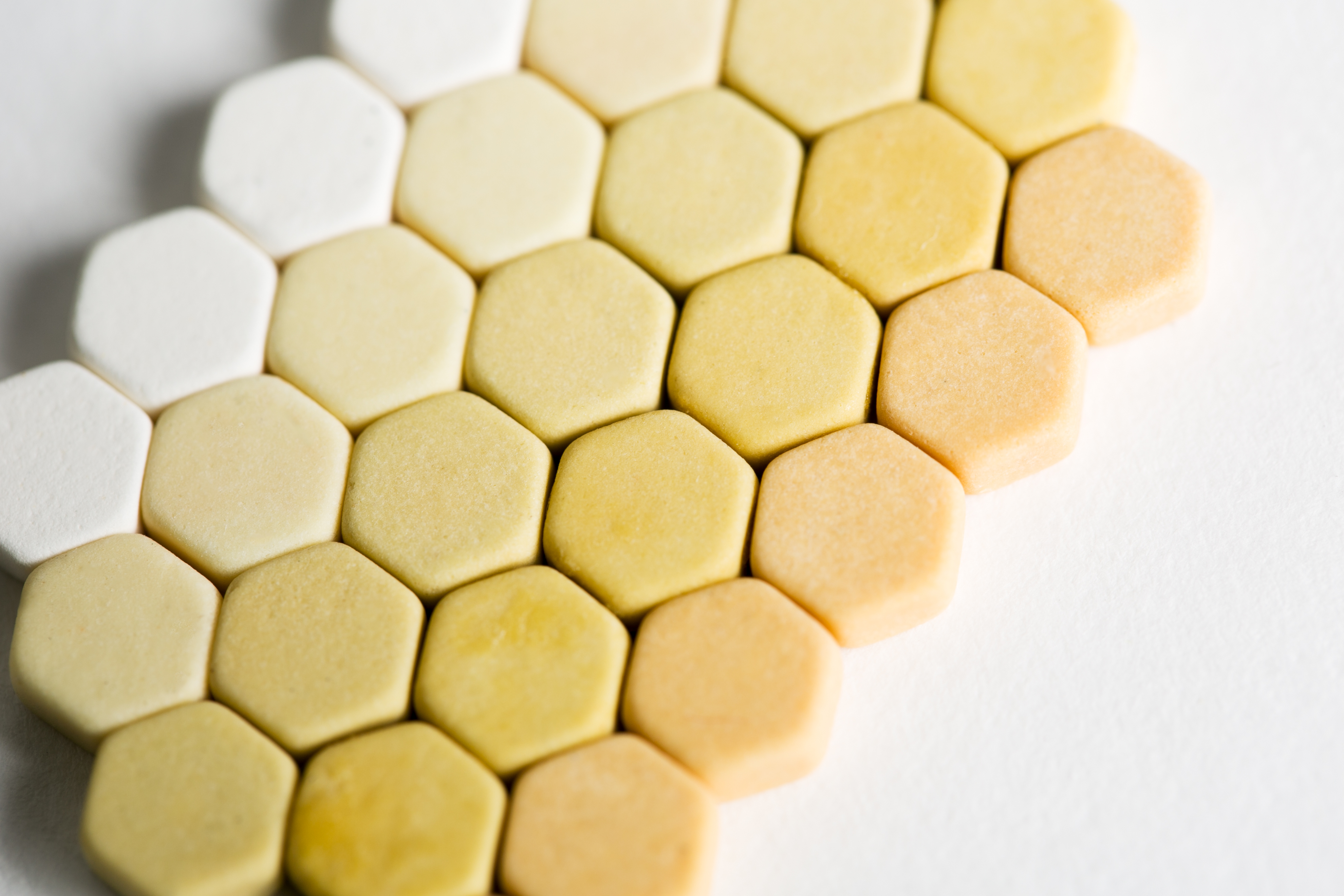Right now, more than ever before, people are focused on health and wellness. Having a strong immune system is the best defense against any virus or bacterial infection. It can also lower your risk of developing chronic diseases and symptoms.
Did you know that only one tea plant genealogically exists on the planet? It’s true! The Camellia sinensis tea plant is from the Theaceae family of evergreen shrubs. Authentic or true teas all originate from the same species of plant, including green tea, oolong, black and white teas.
Then there are other ‘teas’ that are really not officially tea but a combination of edible flowers and herbs known to have a medicinal benefit. That includes plants like chamomile, mint, ginger, thyme, and many more.
Health changes don’t have to be big, to make a difference. In fact, health experts recommend that you start with one small change first. And if you are used to drinking high caffeine beverages or sugary drinks with no nutritional value, a couple of glasses or cups of tea a day could be a positive new healthy habit.
Hot or cold tea may also be a great way to intake medical marijuana. If you are experimenting by creating your own edibles at home, don’t forget cannabis-infused beverages. Sipping your cannabis can make intake easier (and more delicious).
Tea Has Interesting (and Macabre) Origin Stories
Those dried leaves are a big deal in many parts of the world. But when you think about tea, do you think about the British? The United Kingdom may have made tea their official beverage, but it didn’t become popular there until the 17th century.
The first record of people drinking (and loving) tea was in the 3rd century. It was a text about medical cures and therapies written by Hua Tuo. Tea was imported to North America by merchants and clergy from Portugal in the 16th century. The British introduced tea to India to compete with China, which held a monopoly on tea exports.
There is an ancient legend about tea that stems from the Tang Dynasty. Bodhidharma (the monk and deity who founded Chan Buddhism) fell asleep meditating in front of a wall. According to the legend, he woke up nine years later. Upset that he had lost himself for so many years in meditation, the deity apparently cut his eyelids off and cast them to the ground. Where they immediately rooted and grew into tea bushes.
The Tang dynasty (618 – 906 AD) also created Cha Jing (The Classic of Tea), which was basically a “tea for dummies” anthology. It described how to cultivate tea plants, process them, and properly prepare hot tea for drinking. The Tang dynasty was so gung ho about tea they even used it as currency. Quality tea leaves were pressed into bricks after steaming.
The Health Benefits of Drinking Tea Daily
The myths about the medicinal benefits of drinking tea are actually true. If you buy high-quality tea, you are getting tannins and polyphenols (catechins and epicatechins) that increase metabolism and can help you lose weight.
Generally speaking, the highest quality teas are not found in your local grocery store. You want the ‘good stuff’ to get the maximum benefit of the healthy herbs. As you know, terpenes and flavonoids can degrade over time. Buy fresh, loose leaf tea at a specialty tea shop or a health food store to find the best quality for medicinal use.
There are many wellness benefits associated with drinking tea on a daily basis. Here are five reasons why tea is so good for you:

1. Cannabis Tea Has High Levels of Antioxidants
Every day, your body absorbs things that damage your health. Food, water, polluted air, and other things we come into contact with contain free radicals at the cellular level. Think of them as invaders that hitchhike on healthy cells and damage them.
The damage that free radicals do to cells is called oxidation. We should all look for foods and beverages that are high in antioxidants to reduce the damage free radicals do to our cells. When cells become mutated by free radicals, that is when the risk goes up for developing chronic diseases like Crohn’s, diabetes, cancer, and more.
Hibiscus (flor de Jamaica) is the tea strain with the highest level of natural antioxidants. After being activated by hot water, Hibiscus tea has 400% more antioxidants than green tea or black tea.
2. Helps with Digestion
Did you know that teas can really help if you are experiencing digestive upset? Good quality tea can support your metabolism and help process rich foods in the digestive tract. Drinking a few cups of tea per day may also help you reduce bloating.
Some of the best teas to choose for digestive upset are:
- Ginger
- Dandelion Root
- Licorice Root
- Peppermint
- Oolong
- Green tea
The tannins in tea bind to both carbohydrates and proteins in food. That helps reduce irritation in the digestive tract. However, some people with food allergies or sensitive digestive tissues can experience nausea or stomach aches if they have a reaction to tea with high levels of tannins. Start with diluted or less concentrated cups of digestive teas to see how well your body will tolerate it.
3. Lowers Risk for Some Chronic Diseases
Because tea has powerful anti-inflammatory properties, it may offer some preventative protection against diseases that are caused by chronic inflammation. That includes gastrointestinal disorders like GERD, Crohn’s disease, diabetes, Celiac disease, and even help protect the stomach against ulcers.
There has also been a recent study to determine if green tea can help protect people against contracting the Covid-19 virus. In the clinical study, green tea was noted to suppress some of the inflammation responses caused by the coronavirus (cytokine storm). The study suggested the green tea may also help fight sepsis infections and lung fibrosis.
4. May Help with Weight Loss
You’ve probably seen many advertisements for diet tea. Magical weight loss teas sell pretty well because they can provide benefits. What some Americans don’t know, however, is that the weight loss benefit from a ‘diet tea’ can also be realized by drinking regular tea—every day.
Some of the science behind weight loss teas is correct. The caffeine and catechins of caffeinated teas boost the metabolism. That, combined with the caffeine, can help you burn more calories. Catechins also help the body break down fat more efficiently.
5. Can Promote Natural Anxiety Relief
If you have clinical anxiety and find it challenging to deal with anxiety symptoms, some types of tea could help. You’ve probably heard of herbal teas that are good to drink before bedtime. They are types that have more relaxing and stress-busting terpenes and less caffeine.
Do you drink your iced tea or hot tea with a lot of sugar? Get ready for some bad news because you lose almost all the healthy benefits of drinking tea when you add sugar to it. So much for the official ‘healthy’ beverage of the southern United States. If you are eating out, your best bet is to order an iced tea with lemon and monk fruit or stevia sweetener.

What Kinds of Tea and Herbs Provide the Most Health Benefits?
If you are passionate about buying the best quality tea, you may want to make a special trip to an emporium or specialty shop. There, you are going to find a vast selection of organic teas. And most shops will allow you to mix and match to create your own herbal teas too.
When you walk in, be prepared for a terpene buzz, however. The scent of all the fresh loose teas and herbs may make you feel more alert or relaxed. Tea shops will also allow you to smell samples of each tea and suggest different types that may help with chronic pain, migraines, fatigue, and other symptoms.
Among the different strains of teas, these ones are known for providing health benefits:
1. Green Tea
Green tea is one of the most popular types and is thought to have medicinal benefits. It also is rich in terpenes, including beta-caryophyllene, D-Limonene, Geraniol, Myrcene, and Humulene. A 2017 study published in the Journal of American Chemical Society found that one unique polyphenol found in green tea (epigallocatechin gallate) could lower the risk of developing Alzheimer’s disease.
2. Jasmine Tea
There are many wellness benefits that drinking Jasmine tea can provide. But one of the interesting aspects of Jasmine tea is that it can help kill Streptococcus mutans. That is the bacteria that produce acid that deteriorates tooth enamel. Drinking Jasmine tea regularly can help prevent tooth decay. You can also use it as a daily mouthwash.
Want to be relaxed but also focused and alert? Jasmine tea has an amino acid called L-theanine. This triggers your body to release something called gamma-aminobutyric acid (GABA). It is a neurotransmitter that helps reduce stress.
But when L-theanine and caffeine are combined, they boost brain function, stimulating both dopamine and serotonin. And it can also help improve short-term memory recall. That makes Jasmine tea perfect for sipping during the day when you are at work or running around.
3. South African Rooibos (Red Tea)
South African rooibos or red tea has a high antioxidant content. And the tea has some very unique polyphenols like aspalathin. The flavonoid aspalathin was first discovered or isolated in 1965 and studied. Aspalathin may have antidiabetic qualities if used on a daily basis.
Inside the African Rooibos plant and tea are elements that help protect cells and prevent damage from free radicals. That can also reduce the risk of developing chronic and inflammatory conditions like cancer, diabetes, and heart disease.
4. Hibiscus Tea
Not technically a tea but a ‘tisane’ or herbal tea, Hibiscus provides a powerhouse of medicinal benefits. The calyces are used for tea, but you can make Hibiscus tea out of any part of the plant. Some studies suggest that hibiscus tea can provide cardiovascular benefits.
The tea may help regulate systolic and diastolic blood pressure. And the polyphenols found in the leaf of the hibiscus may help kill off skin cancer cells, according to a clinical study published in 2015. A second study in 2015 also suggested Hibiscus tea may help slow the growth of prostate cancer cells.
You can get too much of a good thing. All high-quality tea should be viewed as a medicinal supplement. Adults’ moderate or safe intake would be 3-4 cups (24 – 32 fluid ounces per day). Drinking more than that amount can result in side effects, including headaches, anxiety, insomnia, and problems with digestion.
Remember to always check with your doctor before starting any new supplement or radical change to your diet. All high-quality teas contain extracts that could be contraindicated with prescription medication. Treat tea like you would a nutritional supplement, and make sure that it doesn’t conflict with your current medications.
Brew Your Own Iced Cannabis Tea and Label It for Safety
Tea is a convenient, healthy drink. It can easily be reheated without losing flavor (unlike coffee). You can add some more loose leaves and top it up with hot water to drink throughout the day. And, of course, you can use the leftover hot tea to make a delicious home-brewed iced tea later.
In the South, almost anything you order in a restaurant comes with a gallon of sweet tea. Sweet tea is somewhat less popular in other places in the United States. If drinking hot tea will never be your ‘thing,’ why not keep a pitcher of steeped sweet tea in your fridge?
Brewed tea can be kept in your fridge for up to five days. Make sure you store your infused iced tea in an airtight container. And if you live with other people, put a big label on that container. The last thing you need is your mom tripping out after drinking a tall cold glass when you aren’t watching.
If you prefer hot tea, you can steep your loose leaves (recipes below) and enjoy. But if you don’t finish the pot, you can also pour it into a container and enjoy it over ice later.

How-To Make Your Own Cannabis Tea
If you are lucky, you live near a tea emporium. Asian markets are also a great place to find high-quality loose teas that you can mix and match. Most specialty shops have a tea sommelier, who is a professional who can recommend different types of tea based on your wellness goals.
Step 1: Mix Your Dried Tea
One of the best things about tea is how many flavors and varieties there are. Not just of ‘true teas’ but also the herbal varieties. And that means you can pick a variety of different types of teas to make your signature cup.
If you are visiting a tea shop, look at different dried herbs that can be mixed with your favorite tea. For example, you may want to mix dried Hibiscus herbal tea with lemon to add the limonene terpene benefits. Lemon is a great additive as limonene can boost mood, reduce stress, and it also has antifungal and antibacterial properties.
Step 2: Decarboxylate the Cannabis
How you decarboxylate your cannabis doesn’t matter. What does matter is that you remember to use activated cannabis. Otherwise, the only thing you will experience with your tea is an acrid undertone of dank flavor.
Check out our tips for decarboxylating cannabis at home.
Step 3: Tumble, Crumble and Grind Your Cannabis Tea
Crumble up your decarboxylated cannabis. Some people prefer to grind up cannabis because they feel it will increase its psychoactive properties. But you are steeping the cannabis with other herbs for your tea. The hot water will extract the THC-9 either way. So, choose chunky or smooth; it won’t make much of a difference.
Step 4: Store in Airtight Container
Mason jars are the best for saving your DIY wellness tea at home. They have an airtight lid. And you can also see through the glass and check for mold. While tea has very high antifungal properties, if you store it in a container with any kind of moisture, you may get mold. So double-check and make sure that your container is bone dry before you store your tea.
Cannabis-Infused Tea Recipes
Any homemade tea recipe can be transformed into a cannabis-infused beverage. But some recipes have herbal combinations that work really well with cannabinoids in terms of providing symptom relief from pain, anxiety, muscle aches, insomnia, and other conditions.
We searched for some of the most interesting and healthy homemade tea recipes. Here are some food bloggers who specialize in making herbal teas that you can explore. And some amazing recipes!
- “How to Make Your Own Herbal Teas” on The Spruce Eats
- “52 DIY Herbal Tea Recipes” on No-Fuss Natural
- “Make Your Own Herbal Tea Blends” on Feasting at Home
Does making your own herbal tea from scratch sound like too much work? Remember that you can also add a Delta-9 THC tincture to your cup of tea anytime if you are traveling or if you want to take a shortcut. Or use a teaspoon of cannabis-infused butter in your cup.
What Type of Cannabis Do I Buy to Make Tea?
When you are preparing cannabis tea, don’t forget that you don’t have to use premium flower to get good results. In fact, you can use cannabis stems in your tea. If you have trimmings, stems from the cannabis plant, you can decarboxylate them, crush and mix them in with your herbal tea.
Don’t waste your weed stems. And if you have purchased cannabis that was seeded, save those seeds! While you don’t want to decarboxylate cannabis seeds (it will turn your oven into a scary friendly fire), you can crush them up using a coffee grinder. Then add the powder to your wellness tea. The seeds contain valuable fatty acids that are good for you.
In choosing the right strain for your tea, consider making different varieties depending on the effect you want to achieve. For example, low caffeine tea can be combined with a mild Indica to promote relaxation and help with insomnia.
How Much Cannabis Should I Add to My Herbal Tea?
There is a general rule when estimating the dosage of THC. You add a zero behind the percentage of THC content in the cannabis per gram. For example, if you have whole flower that you are ready to decarboxylate, and it is 15% potency, that means there would be about 150mg of THC in your cup.
However, there are a few factors that can change how potent your tea becomes. First, the age of the dried cannabis. Has it been decarboxylated and stored for a long time? That may result in a lower potency tea. Also, the strength of the tea depends on how long you steep it. The longer you infuse your tea, the higher the THC potency is likely to become.
Remember that it takes about 15 to 30 minutes to start feeling the psychoactive effects of any edible. Don’t underestimate the potency of your cannabis tea. Enjoy it at home.
Featured Image: Canva






